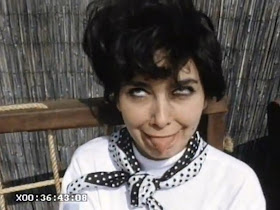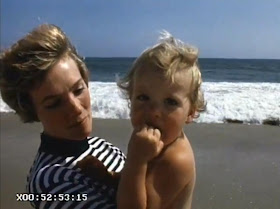 In these cases, the interloper is usually drawn as a very broad, one-dimensional villain with a superiority complex. An audience wishes the smitten lover would regain common sense and value the down-to-earth, best friend who is obviously the better match from the beginning. However, in its casting of Ms. Nixon, Chance at Heaven brings great compassion to an antagonist. The pixie-faced young lady bemoans a stuffy life filled with rules and expectations that she cannot abide.
In these cases, the interloper is usually drawn as a very broad, one-dimensional villain with a superiority complex. An audience wishes the smitten lover would regain common sense and value the down-to-earth, best friend who is obviously the better match from the beginning. However, in its casting of Ms. Nixon, Chance at Heaven brings great compassion to an antagonist. The pixie-faced young lady bemoans a stuffy life filled with rules and expectations that she cannot abide.Ms. Nixon plays Glory as a good-natured, fun-loving trooper with more than a dash of sincerity, making her a very empathetic character. Hers is one of the few roles in this tale that is allowed to be honest about what she wants. What does she want? Gorman’s liberated lifestyle. [Also, he’s a hunk.] Unlike Glory, the entrepreneur answers to no one. He is his own boss which attracts the caged canary.
This is one time in which “meetcute” is the apropos word for a couple’s first encounter with each other. The adorable and perky lady accidentally drives over the gas station's one and only wooden bench and makes flirty remarks about Gorman needing to remove buildings in her path. Gorman just grins in that “aww shucks” kind of way. That's movie code for "they're getting hitched, folks."
They marry, much to the chagrin of two people - Glory's mother (Virginia Hammond) is one. Mrs. Franklyn will not forfeit control of her daughter's life without a fight. However, as manipulative movie mothers go she's anemic. Mrs. Franklyn is the one-dimensional snob in our story, but she seems to have little power, which makes her presence pointless. We rarely see her; she's not often discussed; after the wedding, little suggests that this mother will have any sway over the daughter.

In one pivotal scene, where Mrs. Franklyn tries to persuade her daughter to abandon her new lifestyle, the mother is seated with her back to the camera in such a way that further reduces the strength to her words. Look at the newlyweds. They seem to be ignoring her.
One recalls the commanding presence of Gladys Cooper in Now, Voyager (1942), Separate Tables (1958) and My Fair Lady (1964) as she orders her adult children about - every crisply-enunciated syllable biting at their self-esteem. How delicious! One grows perversely contemptuous of Mrs. Franklyn for not being more of a fire-eater to maintain the illusion that this dysfunctional mother-daughter dynamic exists.
 The other person who is not thrilled with the nuptials is, of course, Marje. She has pursued her best bud for two years and gets her heart handed back to her in a rather callous scene that only McCrea's charm can soften for audience consumption. It's enough to make a strong woman crumble and become despondent. But this is Ginger Rogers. (Ah, that casting again.) She's not weak; any pity on the audience's part is unnecessary. You know she can tough out any situation. You expect that she'll go on with life and she does. Maybe she's too self-sufficient, because, unfortunately for the movie's plot, that means you're ok with her not getting the guy (which is clearly not what the writers had in mind, as you'll see at the end).
The other person who is not thrilled with the nuptials is, of course, Marje. She has pursued her best bud for two years and gets her heart handed back to her in a rather callous scene that only McCrea's charm can soften for audience consumption. It's enough to make a strong woman crumble and become despondent. But this is Ginger Rogers. (Ah, that casting again.) She's not weak; any pity on the audience's part is unnecessary. You know she can tough out any situation. You expect that she'll go on with life and she does. Maybe she's too self-sufficient, because, unfortunately for the movie's plot, that means you're ok with her not getting the guy (which is clearly not what the writers had in mind, as you'll see at the end). As Glory eagerly dons the mantle of cheerful, devoted wife living sans inheritance (and making a mess of everything in her new house), an unexpected dynamic is born - Marje becomes the debutante's surrogate mother. Yes, the woman scorned is won over by the infantile foibles of her ex-lover's new bride. Marje even sweetly calls her "baby" without a hint of sarcasm and indulges Glory's homemaking questions. I didn't see that coming.
While the camera unfairly laughs at Glory's domestic deficiencies, it exalts Marje. Who knows that Gorman's favorite dish is chicken pie? Marje knows and she teaches Glory the recipe. Who comes to the rescue when painting the house is overwhelming? Marje does without irritation.
Just when you think the girl-next-door will live out the rest of her days as a patient, forgiving mother-figure to her arch rival, something upsets the happiness. In one of the most implausible plot twists ever, the new wife returns to her mother's bosom. Marje sticks around to take Glory's leftovers - in meals and in men.
I could not have been more shocked and disheartened. Everything was going so well. Too well. Why did they end it in that way? This is one of the few times when you do not mind that the girl-next-door doesn't get her man. Plus, it throws her "friendship" with Gorman's wife under suspicion. I wonder if Marje made a pact with Mrs. Franklyn at a crossroads one dark and stormy night.













.jpg)







